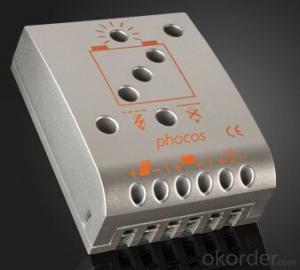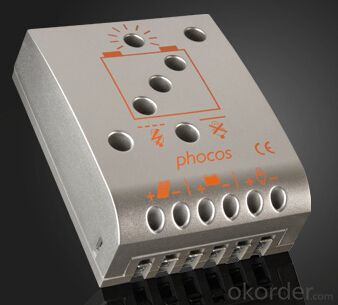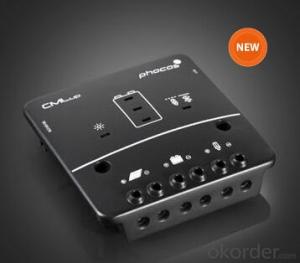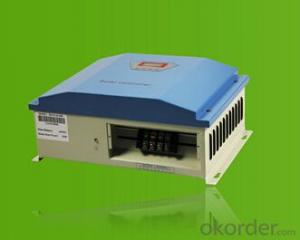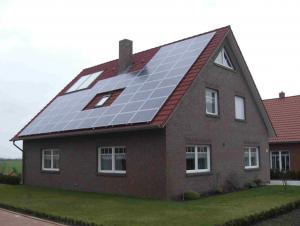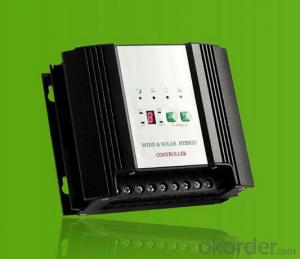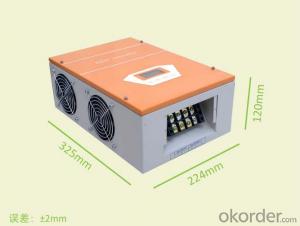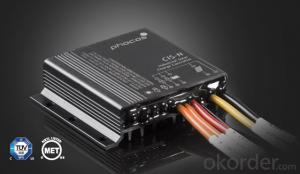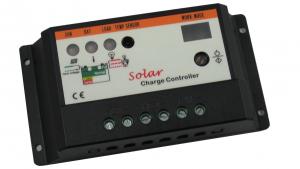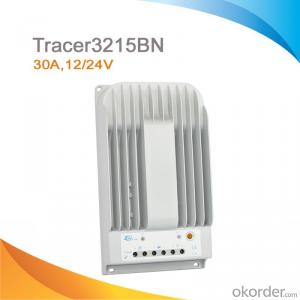CML Series (5-20A) MPPT Solar Charge Controllers
- Loading Port:
- China Main Port
- Payment Terms:
- TT OR LC
- Min Order Qty:
- -
- Supply Capability:
- 10000 unit/month
OKorder Service Pledge
OKorder Financial Service
You Might Also Like
· Battery State-of-Charge display with 3 LEDs
· Acoustic load disconnect pre-warning
· PWM-regulation (series type)
· Boost, equalize and float charging, also for VRLA
· Automatic 12/24 V detection
· Integrated temperature compensation
· Large terminals (up to 16 mm2wire size)
· SOC and voltage controlled LVD
· Fully electronically protected
· The CML series is a sophisticated solar charge controller family for low cost applications. The electronic circuit is equipped with a microcontroller that provides high- efficiency charging technology together with a number of outstanding status display, warning and safety functions. The temperature-compensated three-stage PWM charging method (boost-equalization-float) is now adjustable tosealed and vented lead-acid batteries. The new version also allows an either SOC or voltage controlled low voltage disconnect function. The battery status is clearly indicated by three LEDs.
· As the first controller on the market in this price range it comes with an acoustic low voltage load disconnect pre- warning feature.
- Q: Do solar controllers require regular maintenance?
- Regular maintenance is required for solar controllers. Although they are built to be durable and reliable, it is necessary to perform regular maintenance to ensure optimal performance and longevity. Some common maintenance tasks include cleaning the solar panels to remove dirt or debris that could reduce efficiency, inspecting the wiring and connections for damage or corrosion, and checking the controller's display and settings to ensure proper functioning. It is also recommended to periodically test the system's battery voltage and charge controller settings to ensure they are operating within desired parameters. Regular maintenance not only helps identify potential issues early on but also maximizes the efficiency and lifespan of the solar controller.
- Q: Are there any disadvantages of using a solar controller?
- Yes, there are a few potential disadvantages of using a solar controller. Firstly, solar controllers can add an extra cost to the overall solar power system setup. Additionally, some solar controllers may have limited compatibility with certain solar panel systems or may not be able to handle high voltage outputs. Another disadvantage is that solar controllers can introduce a small amount of energy loss, reducing the overall efficiency of the solar power system. Finally, certain types of solar controllers may require regular maintenance or replacement, adding to the overall maintenance cost of the system.
- Q: What is the role of a battery capacity monitor in a solar controller?
- The role of a battery capacity monitor in a solar controller is to measure and display the current state of charge of the battery bank. It helps users keep track of the amount of energy stored in the batteries, allowing them to make informed decisions about energy usage and ensure the batteries are not overcharged or discharged beyond safe levels. This helps maximize the lifespan and efficiency of the batteries and ensures the reliable operation of the solar power system.
- Q: Can a solar controller be used with a solar-powered street lighting system?
- Yes, a solar controller can be used with a solar-powered street lighting system. A solar controller helps regulate and optimize the charging and discharging of batteries in a solar-powered system, ensuring efficient operation and extending battery lifespan. It is an essential component in managing the power flow between the solar panels, batteries, and street lights in a solar street lighting system.
- Q: Can a solar controller be used with solar-powered medical equipment?
- Yes, a solar controller can be used with solar-powered medical equipment. A solar controller regulates the voltage and current from the solar panels, ensuring that the medical equipment receives a stable and efficient power supply. This helps in maintaining the performance and longevity of the equipment while utilizing solar energy as a sustainable power source.
- Q: How do you protect a solar controller from theft?
- One way to protect a solar controller from theft is by installing it in a secure and inaccessible location, such as inside a locked cabinet or enclosure. Additionally, you can use tamper-proof screws or bolts to secure the controller in place and make it more difficult to remove. Adding signage or warning labels indicating that the controller is under surveillance or protected by security measures can also act as a deterrent.
- Q: How does a solar controller handle battery over-temperature disconnect recovery?
- A solar controller is designed to regulate the charging and discharging of batteries in a solar power system. When it comes to battery over-temperature disconnect recovery, the solar controller plays a crucial role in protecting the batteries from potential damage. In the event of battery over-temperature, the solar controller detects the excessive heat and initiates a safety mechanism to disconnect the battery from the charging source. This is done to prevent further heating and potential damage to the battery. Once the battery has been disconnected, the solar controller continuously monitors the temperature of the battery. It waits for the temperature to drop to a safe level before initiating the recovery process. The recovery process involves reconnecting the battery to the charging source and resuming the charging process. During the recovery process, the solar controller closely monitors the temperature of the battery to ensure it remains within a safe range. If the temperature starts to rise again, the controller will immediately disconnect the battery once more to prevent any further damage. Additionally, some advanced solar controllers may have built-in safety features such as temperature sensors or thermal protection circuits. These features provide an extra layer of protection by actively monitoring the battery temperature and taking appropriate actions to prevent over-temperature conditions. Overall, a solar controller handles battery over-temperature disconnect recovery by detecting the excessive heat, disconnecting the battery from the charging source, monitoring the temperature, and initiating the recovery process once the temperature drops to a safe level. It ensures that the batteries are protected from overheating and potential damage, thereby maximizing their lifespan and performance in a solar power system.
- Q: How does a solar controller handle the charging of multiple battery banks?
- A solar controller manages the charging of multiple battery banks by detecting the voltage and state of charge of each bank individually. It ensures that each bank receives the appropriate amount of charging current and prevents overcharging by regulating the charging process. The solar controller also prioritizes the battery banks based on their level of discharge, ensuring that the most depleted bank receives charging priority. This way, it effectively and efficiently handles the charging of multiple battery banks.
- Q: Can a solar controller be used with a solar-powered CCTV system?
- Yes, a solar controller can be used with a solar-powered CCTV system. A solar controller is typically used to regulate and optimize the charging of batteries in a solar power system. In the case of a solar-powered CCTV system, the solar controller would be responsible for managing the charging of the batteries that store the energy generated by the solar panels. This ensures that the CCTV system has a constant and reliable power supply even during periods of low solar irradiance or at night when the panels are not producing electricity. By using a solar controller, the system can efficiently utilize the available solar energy, extend the life of the batteries, and provide uninterrupted power to the CCTV system. Therefore, integrating a solar controller into a solar-powered CCTV system is highly recommended to enhance its performance and reliability.
- Q: Can a solar controller be used with a solar-powered gate opener?
- Yes, a solar controller can be used with a solar-powered gate opener. The solar controller helps regulate and optimize the charging of the batteries connected to the gate opener, ensuring efficient and reliable operation of the gate system.
Send your message to us
CML Series (5-20A) MPPT Solar Charge Controllers
- Loading Port:
- China Main Port
- Payment Terms:
- TT OR LC
- Min Order Qty:
- -
- Supply Capability:
- 10000 unit/month
OKorder Service Pledge
OKorder Financial Service
Similar products
Hot products
Hot Searches
Related keywords
